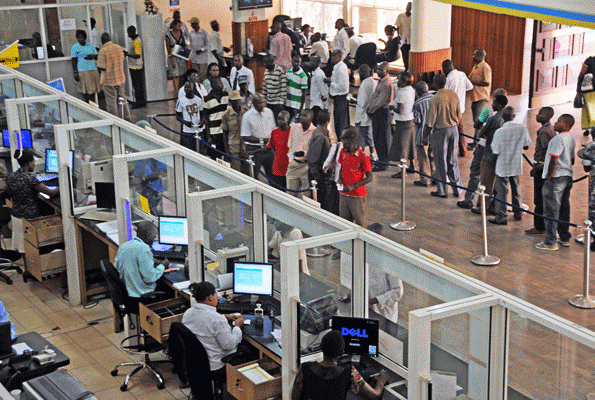A new survey by civil society organisation Twaweza, which does mobile phone surveys with the aim to inform public policy, has revealed that only 17 per cent of Ugandans hold a bank account while 16 percent have an account with a Savings and Credit Cooperative Organisation (SACCOs), calling for more interventions that boost financial inclusion in the country.
The survey which was carried over mobile phone covering 1,905 respondents across the whole of Uganda in November 2018 shows that a clear majority of those in formal employment have an account, well above any other group. “The wealthy, educated, employed are more likely to have bank accounts,” the survey whose findings were launched in Kampala on Tuesday says.
According to the survey, having a bank account is also associated with educational attainment with 41 per cent of respondents with secondary education or higher having an account, compared to 8 per cent of those that have not completed primary school.
The survey says wealthier citizens (34 per cent) are more likely than poor citizens (8-12 per cent) to have a bank account while men (23 per cent) are more likely than women (11 per cent) and residents of urban areas (27 per cent) are more likely than those in rural areas (13 per
cent) to have a bank account.
Robert Mpuuga, a banker while commenting on the survey findings said that policy issues as well as the cost of doing business when it comes to borrowing have made it unattractive for people to borrow from commercial banks or open bank accounts, pushing people to SACCOs and mobile money platforms.
Citizens’ borrowing to finance priorities
On borrowing to finance different priorities in the past year, the survey shows that 32 per cent of the respondents borrowed mother either formally or informally. The survey says the number is fairly consistent across different demographic groups, though it is a little lower among the younger (23 per cent), and older (27 per cent) citizens than those in between (32-42 per cent).
The survey further shows that most or 10 per cent of Ugandans borrow from village savings group or village savings and loans association (VSLA) and a further 6 per cent borrowed from a SACO. “This means that half of those borrowing money have done so from community savings and credit groups,” the survey that is intended among others, to inform policy making in the country, says.
According to the survey 11 per cent of the citizens who responded to the survey took loans for training or education purposes while 10 percent took loans for business reasons. Others took the loans for medical reasons, daily household expenses, housing or mortgage. 68 per cent of the respondents said they took no loans during the period the survey was carried out.
Mobile money account
The survey also established that 73 per cent of the citizens reached own a mobile money account, with men carrying 76 per cent while women making 70 per cent as having mobile money accounts. Meanwhile the survey shows that 86 per cent of urban residents have mobile money accounts compared to 68 per cent of residents in rural areas.
By age, the survey findings show that those aged over 55 years (65 per cent) are less likely to have a mobile money account than others (73-75 per cent).
The research findings also show that 92 per cent of those in wealthier households have a mobile money account compared to 55 per cent of the poor households.
It also says that those with higher levels of education and those in households with income from formal employment are more likely to have a mobile money account.
Marie Nyanzi, the programme officer at Twaweza while speaking about the survey said they share such findings with government, the civil society in order to help address the concerns through appropriate interventions.
Recent changes in mobile money taxes
According to the survey, only 41 per cent of citizens are aware of the recent changes in mobile tax and can state what some the changes are. 3 per cent say are aware that changes to taxes have been made but don’t know what the changes are. 28 per cent of the respondents on the other hand are not aware of any changes while a similar 28 per cent don’t have a mobile money account.
The survey says 71 per cent of the citizens who aware of the new taxes disagree with the changes and majority, according to the survey, say the taxes have reduced their transactions. Of these, 37 per cent say their practices remain unchanged even after the introduction of new taxes while 6 per
cent of the respondents who aware of the new taxes say they have increased their transactions.
Andrew Rugamba, Head Financial Service Airtel Money said that despite the recent 0.5 per cent taxes imposed on withdraw of mobile money, transactions continue to grow even though they went down at the introduction of the tax. He said telecom companies offer microloans that were not being offered by banks.
Regina from Southern and Eastern Africa Trade and Information Institute (SEATINI), while commenting on the survey findings said that taxes are good for national development but added that some rich individuals and multinational corporations in the country are not paying their fair share of the taxes.
Borrowing mobile money or airtime
53 per cent of the citizens interviewed say they have borrowed either mobile money or airtime at some point since 2017. The most widely used service is MTN Xtra for airtime, Beerako on Airtel, each making 35 per cent and 20 percent respectively. Other services used to borrow by citizens are; Wewole, Mo Kash and Wetase.
Cost of mobile services
The survey says most respondents or 79 per cent say the mobile money service is too expensive relative to the quality of the service provided. “This has increased from…32 per cent who felt this way in 2017,” the survey says. 3 per cent of the respondents say the service is cheap compared to 22 per cent who said so in 2017.







